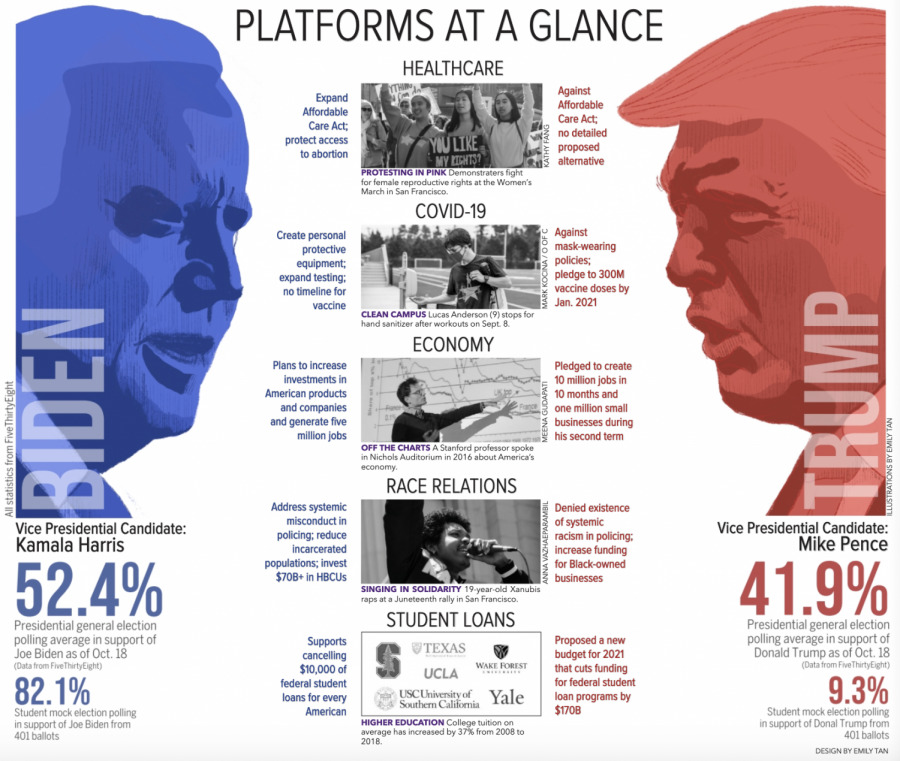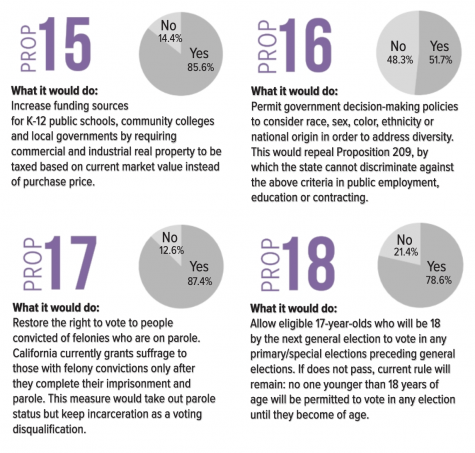What you need to know on Election Day 2020
November 2, 2020
Although we might not know who our next president will be tonight, the United States needs its voters all the more to truly embrace the historical democratic processes of this nation. We urge our readers to follow us along with our live coverage tonight and to continue to be informed, civically engaged citizens.
After months of campaign stops, policy proposals and debates, Election Day is finally upon us. Harker Aquila is launching our Election Day coverage tomorrow with regular live updates and community reactions starting at 4:30 p.m. as polls begin closing on the East Coast and results start coming in. Check in with this package to stay informed tonight as incumbent President Donald Trump battles former Vice President Joe Biden in this historic presidential election.
Democrative nominee Biden has been consistently leading six to 11 percentage points since June and currently stands at an 8.4 percent polling lead against Trump. His lead continues to hold out in critical Rust Belt states like Wisconsin, Michigan and Pennsylvania (+4.7 percentage points) that voted for Trump in 2016. Pennsylvania, with 20 electoral votes, is a crucial state for both candidates to win if they want to clinch the election.
Trump approaches the night with shaky positions in several battleground states like North Carolina and Florida as well as other historically solid Republican states like Arizona, Texas and Georgia.
Despite an ongoing pandemic that has infected over nine million Americans, voter turnout has already surpassed numbers in 2016. Compared to the 138 million votes cast in 2016, over 100 million votes have already been cast, with turnout possibly reaching 150 to 160 million by the end of today, according to AP News. Statistically, more than one out of four votes were cast either by new or infrequent voters.
With Republicans currently outnumbering Democrats 53 to 45 in the Senate, Democrats need a net gain of at least four Senate seats to flip the chamber. Some key Senate states include Susan Collins (R-M.E.) v. Sarah Gideon in Maine, Cory Gardner (R-C.O.) v. John Hickenlooper in Colorado, Martha McSally (R-A.Z.) v. Mark Kelly in Arizona and Thom Tillis (R-N.C.) v. Cal Cunningham in North Carolina. In terms of the House, the Democratic Party already holds a substantial majority and could even expand its majority with tonight’s election.
Critical battleground states that will greatly influence the outcome of tonight’s election include Arizona, Florida, Georgia, Michigan, Minnesota, North Carolina, Pennsylvania and Wisconsin. These eight states account for 127 electoral votes and represent important votes for both candidates. Trump is looking to maximize support among rural voters in these states, while Biden is hoping to energize African-American and Latino voters in the big cities.
Locally, Rep. Anna Eshoo (D) is running against Rishi Kumar (D) for California’s 18th congressional district. Eshoo is highly favored to win the election with more than a 40 percent lead, according to polling data from FiveThirtyEight.
The 2020 election has been plagued by endless crises and scandals, from the impeachment trial and coronavirus pandemic to this summer’s protests and a reconfiguration of the Supreme Court. The added delays of mail-in voting will affect when official election results can be confirmed, which has already led to a number of legal battles that are bound to continue into the coming weeks.
Although we might not know who our next president will be tonight, the United States needs its voters all the more to truly embrace the historical democratic processes of this nation. We urge our readers to follow us along with our live coverage tonight and to continue to be informed, civically engaged citizens.
Trump and Biden face off for 2020 election
As President Donald Trump and Democratic presidential nominee and former Vice President Joe Biden have championed their parties’ respective platforms on the campaign trail, the two have varied decisively on healthcare, racial injustice, the economy, student loans, and their response to the COVID-19 pandemic. Here is Harker Aquila’s breakdown of the candidates’ stances on these five issues.

A breakdown of the propositions on the California ballot
California ballots will include 12 propositions to be voted on in this election, and each one is described below. Additional insight into Propositions 15, 16, 17 and 18 are also included, paired with the results of Harker’s Student Mock General Election. For more information, view the official voter guide here.
Proposition 14: Authorizes $5.5 billion in state bonds for stem cell and other medical research
Proposition 15: Increases funding sources for K-12 public schools, community colleges and local governments by requiring commercial and industrial real property be taxed
Proposition 16: Permits government decision-making policies to consider race, sex, color, ethnicity or national origin in order to address diversity by repealing Proposition 209
Proposition 17: Restores suffrage to people convicted of felonies and who are on parole
Proposition 18: Allows 17-year-olds who will be 18 at the time of the next general election to vote in primaries and special elections
Proposition 19: Changes tax assessment transfers and inheritance rules
Proposition 20: Makes changes to policies related to criminal sentencing charges, prison release and DNA collection
Proposition 21: Expands local governments’ power to use rent control
Proposition 22: Considers app-based drivers to be independent contractors and enacts several labor policies related to app-based companies
Proposition 23: Requires physicians to be on-site at dialysis clinics and prohibits clinics from reducing services without consent from the state
Proposition 24: Expands the provisions of the California Consumer Privacy Act (CCPA) and creates the California Privacy Protection Agency to implement and enforce the CCPA
Proposition 25: Replaces cash bail with risk assessments for suspects awaiting trial

